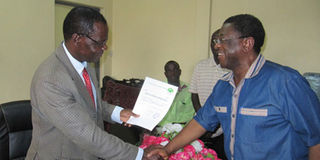Most senators have been in the trenches for a long time

Former attorney general Amos Wako receives certificate from Busia county IEBC coordinator Bittar Odoyo after being cleared. Former attorney-general Amos Wako is the Busia County Senator-elect. Photo/FILE
What you need to know:
- Veteran politicians find their way to new Upper House after serving State in various ways
More than half senators-elect are veteran politicians who have served in various capacities in Parliament and government.
They include former attorney-general Amos Wako (Busia), Cabinet ministers James Orengo (Siaya), Moses Wetang’ula (Bungoma), Mutula Kilonzo (Makueni), Yusuf Hassan Haji (Garissa), Anyang’ Nyong’o (Kisumu), John Munyes (Turkana), Kiraitu Murungi (Meru), and Mohammed Kuti (Isiolo), Dan Mwazo (Taita Taveta) and Otieno Kajwang’, well-known for his singing prowess at political rallies, and Wilfred Machage (Migori).
Former assistant ministers who made it to the Senate are David Musila (Kitui), George Khaniri (Vihiga) and Abu Chiaba (Lamu).
Bull-fighting enthusiast
Others are veteran politicians Mutahi Kagwe (Nyeri) and G.G. Kariuki (Laikipia), Daniel Karaba (Kirinyaga), Kembi Gitura (Muranga), Boy Juma Boy (Kwale), Muriuki Karue (Nyandarua), Gideon Moi (Baringo), Lenny Kivuitu (Embu), Sammy Leshore (Samburu), Johnstone Muthama (Machakos), Billow Kerrow (Mandera) and Boni Khalwale (Kakamega), known for parliamentary theatrics and as a bull-fighting enthusiast.
Retired judge Stewart Madzayo, who will represent Kilifi County, and former permanent secretary John Lonyangapuo (West Pokot) are other notable politicians who will be taking up their seats in the Senate.
Most of the senators-elect have made a name in parliamentary politics but opted for more challenging assignments in the Upper House, leaving the routine business of legislation to a youthful crop of newcomers.
The Senate has four main tasks that include representing and serving the interests of counties and overseeing State officers and, in particular, determining resolutions on the removal of the President and his deputy from office.
The last time Kenya had a Senate was in 1964 when it was better known as the Upper House. It was scrapped following an amendment to the Independence Constitution, which abolished regional governments (majimbo) and replaced them with a unitarian government.
The new Senate is a creation of the 2010 Constitution and will comprise 67 members, 47 of whom are elected through universal suffrage.
The rest will comprise 16 women nominated by political parties and two representatives each for the youth and for people living with disabilities.
Youthful members
But it is in this House that the old meets the young. Mr Hassan Omar Hassan, the Senator-elect for Mombasa and Gidion Mike ‘Sonko’ Mbuvi of Nairobi, in their 30s, will be among the few youthful members of the House, most of whom will be in their 60s and 70s.
Other youthful members are lawyers Kindiki Kithure (Tharaka Nithi) and Kipchumba Murkomen (Elgeyo Marakwet). They will rub shoulders with elderly politicians like Mr Haji, Senator-elect for Garissa County, and G.G. Kariuki of Laikipia.
Mr Kariuki, a one-time powerful minister for Internal Security in the Daniel Moi era, first went to Parliament in 1963 and has been in and out of the House, defied the odds to make a comeback at the least of expected times.
Some of the people taking seats in the House are crusaders of multi-party democracy in the early 1990s. Then they were known as ‘Young Turks’.
They include Mr Murungi, the Senator-elect for Meru County, and who literally drove himself to the House under the Alliance Party of Kenya humorously known as the “Mbas” (bus) party.
He and his comrades-in-arms James Orengo and Prof Anyang’ Nyong’o were part of the brave and forceful activists who worked with Jaramogi Oginga Odinga, Martin Shikuku, Masinde Muliro and others like Mombasa politician Ahmed Bahmariz to push for the repeal of the notorious Section 2A of the old Constitution that had made Kenya a de facto single-party state.
Significantly, some in their ranks then, Raila Odinga (Cord), Paul Muite (Safina) and Martha Karua (Narc Kenya), contested the 2013 presidential elections.
Except for Mr Odinga, the latter two performed dismally, a sad testimony to the declining relevance of the shining stars of the ‘Second Republic’ crusaders.
The mix in the Senate is expected to provide an exciting ground for battles of the wits, experience and youthful vigour.




